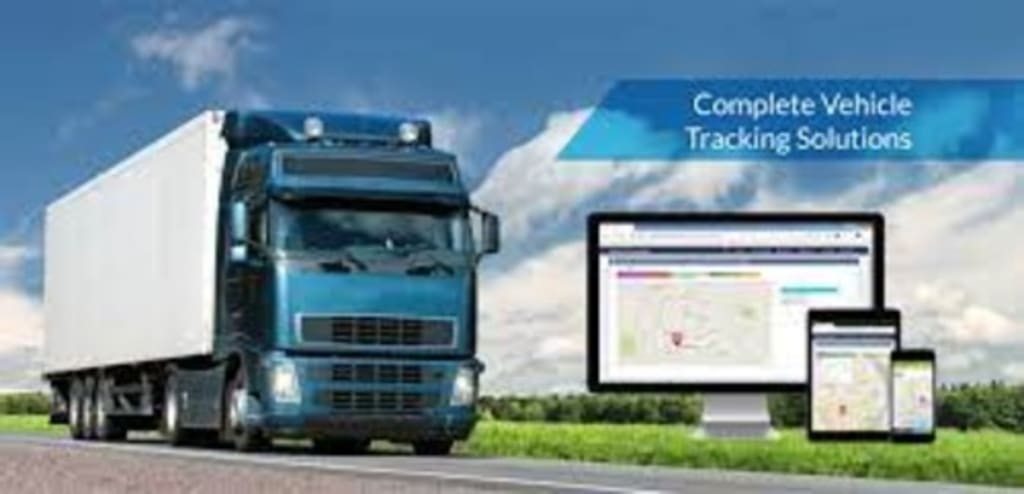How Vehicle Tracking Enhances Fleet Management in the Age of Autonomous Cars
Smart Vehicle Tracking Solutions in the UK

Autonomous cars are revolutionizing the way people travel. With more safety, convenience, and efficiency, they are quickly becoming popular in the transportation industry. Although the technology is advantageous, it poses a challenge to fleet managers: how do they keep tabs on their vehicles with autonomous driving? Fortunately, vehicle tracking solutions are giving an answer to this question, providing a precious resource for overseeing fleets in the era of autonomous cars. This article examines how vehicle tracking improves fleet management with the dawn of autonomous cars.
Driverless cars are coming - but they're not here yet
The advancement of autonomous vehicles has made a significant buzz, and there's no doubt it's an intriguing prospect. Nevertheless, as we are still a way from complete implementation, fleet managers have other matters that need immediate attention. Here's where vehicle tracking solutions come into play.
With the use of GPS technology, these solutions are able to trace the area, speed, and status of vehicles, and thus aid fleet managers to make the best decisions, saving them time and money, as well as delivering the highest customer service. The right tracking software also has other benefits, such as tracking maintenance timetables, controlling fuel usage, and increasing driver safety.
Though, selecting the proper tracking system to fit your requirements could be daunting as there are so many to choose from. We've created a list of 12 explanations why vehicle tracking is an important priority for fleet managers in the era of autonomous cars. So, get comfortable and keep reading!
In the meantime, vehicle tracking is more important than ever
Despite the great potential of autonomous vehicles, they are still in their nascent stages and not likely to become widespread for a considerable time. Thus, fleet managers must rely on conventional methods to handle their fleet and drivers. In this day and age, vehicle tracking solutions have become invaluable for fleet management.
These solutions give fleet managers the ability to track their vehicles' movements in real-time, enabling them to make instantaneous decisions whenever necessary. Vehicle tracking has been known to cut down on downtime and fuel usage.
What's more, it is an excellent means of reducing vehicle theft, since stolen vehicles can be located and recovered in due time. It can save fleet managers significant sums of money that would have been required to replace stolen vehicles.
Vehicle tracking is also very cost-efficient; it helps to save on fuel, minimize maintenance costs and cut down on driver overtime. Moreover, it can bolster customer service by giving real-time data on delivery times and estimated arrival times. Therefore, customers can adjust their schedules accordingly.
Evidently, vehicle tracking has become ever more indispensable. As autonomous vehicles progress towards greater adoption, the advantages of vehicle tracking will become increasingly more conspicuous. By deploying such technology now, fleet managers can secure the future of their operations and gain an edge in a continuously shifting market.
Vehicle tracking helps fleet managers save time and money
Fleet managers are continuously on the lookout for ways to optimize their operations, and save both time and money. One of the most effective tools they can employ to do this is vehicle tracking. With a vehicle tracking solution, managers can have real-time monitoring of their vehicles' locations, speeds, and statuses, which allows them to recognize inefficiencies and make informed decisions in order to improve their operations. Vehicle tracking has the capability to assist fleet managers in several different ways to save both time and money, some of which include:
1. Cutting down on idle time: By having oversight of their vehicles' activities, managers can identify periods of idleness and take action to minimize it, resulting in substantial fuel and maintenance cost savings.
2. Prevention of unauthorized usage: Fleet managers will receive notifications if vehicles are utilized beyond established hours or at different locations, reducing the risk of theft.
3. Enhancing driver behavior: Vehicle tracking monitors driver actions such as abrupt braking or over-speeding and provides drivers with feedback to modify their habits, resulting in less accidents, lower maintenance costs, and improved fuel efficiency.
4. Streamlining dispatching: With location data available in real-time, fleet managers can expediently assign vehicles to new jobs or re-route them to evade traffic or other hold-ups, conserving time and reducing the total number of miles traveled.
5. Scheduling maintenance: Vehicle tracking aids managers in tracking mileage and vehicle usage, permitting them to prepare maintenance plans, therefore reducing downtime and increasing the lifespan of their vehicles.
Vehicle tracking can improve customer service
The utilization of vehicle tracking technology has several important benefits that can assist with enhancing customer service. For instance, companies in industries such as logistics and transportation can use this technology to deliver real-time updates to customers, thus enabling them to arrange their operations with greater precision. Furthermore, vehicle tracking assists in the better management of fleets, meaning that drivers can be monitored for behavior and routes, thereby eliminating delays and furnishing customers with reliable delivery times.
Additionally, vehicle tracking offers proactive communication in the case of unexpected holdups, keeping customers aware of any potential issues that could come up during transit. In sum, vehicle tracking technology can take customer service to new heights, allowing businesses to demonstrate their commitment to excellence by offering real-time updates, proactive communication, and dependable delivery times, setting them apart from competitors and allowing them to build a dependable clientele.
Vehicle tracking can help you go green
Environmental awareness has grown dramatically and businesses have to look for methods to decrease their carbon output. By using vehicle tracking, fleet administrators can assess fuel consumption and identify solutions to decrease fuel usage and emissions. The system can also pinpoint problem areas of a driver's behavior to be improved, such as reckless acceleration or speeding, and direct the driver to save on fuel usage. Additionally, vehicle tracking data allows fleet managers to locate idling vehicles and take the necessary steps to limit the amount of time it spends idling, leading to considerable fuel savings and lowered emissions. It is vital to be conscious of sustainability and vehicle tracking can assist in enhancing efficiency, conserving funds and helping the environment through decreased emissions and the adoption of eco-friendly methods.
Vehicle tracking can improve driver safety
Fleet managers must take a proactive approach to ensuring driver safety, which is one of their primary responsibilities. One way to do this is to install vehicle tracking systems. By monitoring driving behavior and spotting any unsafe habits, like speeding, hard braking, and aggressive driving, it is possible to reduce the chance of accidents. Additionally, it can identify any vehicle maintenance problems that may cause issues. Keeping up with vehicle maintenance will help to lower the chances of a breakdown or accident due to malfunctioning equipment.
All in all, vehicle tracking is instrumental in bolstering driver safety and minimizing the potential for accidents. It helps protect not only your staff, but also other drivers on the road, while preventing expensive insurance claims and potential legal difficulties.
Vehicle tracking can reduce insurance costs
The cost of insurance is a major concern for fleet managers. Did you know, however, that vehicle tracking systems can assist in reducing these costs? Insurers prioritize the reduction of risk, and are thus thrilled when presented with data demonstrating all the efforts you are taking to ensure driver and vehicle safety. Vehicle tracking provides such information, enabling insurers to properly assess your risk and thus potentially reduce your rates.
The metrics of speed, harsh braking, and acceleration are all factors in determining the risk of accidents and insurance claims, which vehicle tracking can keep an eye on. Additionally, certain vehicle tracking systems come with features such as geofencing and driver ID, that help prevent theft and fraud, thereby prompting insurers to offer lower rates.
Though insurance savings shouldn't be the sole purpose for implementing a vehicle tracking system, as the benefits of safety, efficiency, and customer service are equally important, the potential financial gain should certainly be taken into account and could have a notable impact on the budget.
Vehicle tracking can help you track maintenance schedules
Properly maintaining your fleet of vehicles is one of the most important aspects of successful fleet management. It requires continual upkeep, repair and maintenance - a daunting task if your fleet is substantial. This is where vehicle tracking solutions come into play. Through real-time data and analytics on the locations and conditions of the vehicles, keeping track of when each one needs to be serviced is simplified. Most vehicle tracking systems are set up to provide alerts and notifications when a vehicle reaches a particular mileage or timeframe, enabling you to set up servicing appointments in advance.
Being diligent in adhering to maintenance schedules helps in avoiding pricey breakdowns and keeping your vehicles in working order for the long term. Additionally, vehicle tracking systems supply you with insightful information regarding how your vehicles are being used. For instance, if one vehicle is driven more frequently than others, it can be serviced on a more regular basis.
In conclusion, vehicle tracking solutions are a reliable tool in controlling maintenance requirements of your fleet. Through real-time data and automated alerts, you can stay on top of your vehicles' maintenance schedules, allowing your business to run seamlessly.
Vehicle tracking can help you monitor fuel usage
For fleet managers, fuel can be a significant expense. Fortunately, with the assistance of vehicle tracking solutions, monitoring fuel usage becomes easy. Data on fuel consumption can be analyzed to locate and rectify any inefficient practices, allowing fleet managers to save money.
These systems also provide real-time updates on fuel levels, meaning fleet managers can make sure their drivers never run out of gas mid-route. Moreover, some tracking solutions give insights into fuel usage by driver or by vehicle, helping fleet managers recognize who is using more fuel than necessary.
Monitoring fuel usage not only contributes to financial savings, but also reduces environmental impact, as less fuel is consumed and the fleet's carbon footprint is decreased. All in all, keeping track of fuel usage with vehicle tracking solutions is essential for successful fleet management. Not only does it ensure cost-efficiency and ecological responsibility, but it also guarantees safe and efficient operations on the road.
Vehicle tracking can help you plan your route
One of the most significant benefits of vehicle tracking solutions is that they can help you plan your route effectively. By precisely analyzing real-time data on traffic, road closures, and other relevant factors, these solutions can provide you with the most efficient route to your destination. This feature can save you valuable time and money by reducing your overall travel time and fuel costs.
Precise planning of your route with vehicle tracking solutions can also help you avoid traffic congestion, reduce vehicle wear and tear, and minimize the risk of accidents on the road. You can use these solutions to determine the most optimal route based on factors such as the size of your vehicle, cargo load, and other variables. As a result, you can make informed decisions about the best possible route for each specific trip, regardless of the distance or destination.
Vehicle tracking solutions can definitely provide you with real-time updates on your route, alerting you to any delays, detours, or other potential issues. This feature can help you make necessary adjustments to your schedule, ensuring that you arrive at your destination on time and without any unexpected problems.
Vehicle tracking can give you real-time data
Vehicle tracking solutions offer one of the most advantageous benefits of all - real-time data on the status of the fleet. This allows fleet managers to quickly and accurately access the current whereabouts of their vehicles, the condition of each, and the actions of their drivers.
Having real-time data at their disposal is a necessity for fleet managers, as it provides them with the ability to make quick decisions based on the latest information. For instance, if a driver is delayed for a delivery, the fleet manager can access the data and pinpoint the nearest driver to send to the delivery point.
Furthermore, real-time data allows fleet managers to promptly detect and handle any problems that arise. If a vehicle experiences mechanical difficulties, the fleet manager can easily locate the problem and dispatch a mechanic to rectify the situation, averting potential delays and keeping the fleet running as smoothly as possible.
Moreover, this real-time data provides the means for fleet managers to observe and address the behavior of their drivers. Should any driver be caught speeding or acting in an erratic fashion, the fleet manager can promptly identify and address the issue, ultimately decreasing the likelihood of accidents, improving safety and reinforcing customer satisfaction.
Finally, this data can also be used by fleet managers to streamline their operations, aiding in the planning of routes, scheduling maintenance and optimizing vehicle usage by studying and understanding vehicle use, fuel consumption and servicing intervals.
Overall, real-time data is essential for fleet managers who want to reduce costs while simultaneously maximizing the efficiency of their fleet. By utilizing vehicle tracking solutions, fleet managers can harness the power of data and make educated decisions, thus keeping their fleet running in optimal condition.
Vehicle tracking is the future of fleet management
As we progress into the era of self-driving cars, the relevance of vehicle tracking solutions is ever more essential in overseeing fleets proficiently. Autonomous cars are forecasted to lessen the number of accidents and streamline traffic, however, they have yet to spread far enough to completely supplant human drivers. In the interim, fleet managers can utilize vehicle tracking to optimize their operations and acquire a competitive edge in their industry.
With vehicle tracking technology, fleet managers can track the performance of their vehicles in real-time. This data includes location, velocity, fuel consumption, driver conduct, and other indispensable metrics. By exploiting this data to distinguish inefficiencies in their fleet, managers can make data-driven decisions to boost their operations and diminish costs.
Additionally, vehicle tracking can aid fleet managers in optimizing customer service by delivering more precise delivery times and ensuring the right vehicle is directed to the appropriate destination. In addition, tracking can contribute to going green by curbing emissions and exploiting resources more effectively. By optimizing routes and guaranteeing vehicles are performing at peak efficiency, vehicle tracking can also minimize maintenance and repair costs and prolong the lifespan of the vehicles in your fleet.
With real-time tracking, managers can monitor driver conduct, ensuring they observe safe driving methods and maintain safe distances from other vehicles on the road. By spotting risky behavior and training drivers as required, managers can reduce the risk of accidents, protect their employees, and economize on insurance costs.
Moreover, insurance providers recognize the merits of vehicle tracking, frequently providing discounts to companies that apply the technology in their fleets. This way, vehicle tracking can decrease the expense of insurance premiums while also enhancing driver safety.
Ultimately, the future of fleet management is entwined with vehicle tracking technology. By taking advantage of the real-time data available through these solutions, managers can make informed decisions, optimize operations, and elevate the customer experience. Whether you control a small fleet or a large one, vehicle tracking is an indispensable tool to enhance your bottom line, guard your employees, and minimize your ecological impact. Therefore, fleet managers should invest in this technology to stay ahead of the competition and maintain their businesses prosperous.
Conclusion
As autonomous vehicles take their rightful place as the technology of the future, fleet management must keep up with the times by investing in vehicle tracking solutions. Doing so can prove to be highly beneficial, allowing fleet managers to save time and money, provide better customer service, reduce insurance costs, monitor fuel and maintenance usage, plan routes, and obtain real-time data.
As a result, vehicle tracking technology should be seen as a must-have for any business dealing with fleet management. To make sure your company isn't left behind in the era of autonomous vehicles, look for a trusted web and mobile app development company in the UK to help you put a reliable Vehicle Tracking Solutions in place. Don't hesitate to move forward into the future!
Frequently Asked Questions
Q: What is vehicle tracking?
A: Vehicle tracking utilizes GPS technology to observe and trace the speed, place, and effectiveness of vehicles in real-time.
Q: Can vehicle tracking be employed for autonomous vehicles?
A: Absolutely, autonomous vehicles can also capitalize on the advantages of vehicle tracking technology. This helps monitor performance, spot problems, and keep track of the vehicle's position.
Q: How does vehicle tracking assist with fleet management?
A: Vehicle tracking allows fleet administrators to monitor their vehicles in real-time, arrange optimal routes, maximize fuel efficiency, and reduce expenditures connected to car maintenance and repairs.
Q: Does vehicle tracking have a hand in driver safety?
A: Yes, vehicle tracking technology can alert fleet administrators to potential safety risks such as speeding or rough braking. This encourages more responsible driver conduct and reduces the chances of accidents.
Q: Does vehicle tracking help with environmental sustainability?
A: Certainly, vehicle tracking can assist fleet administrators in minimizing fuel consumption and emissions by finding the most suitable routes, minimizing idle time, and detecting possibilities to use more eco-friendly vehicles.
Q: Can vehicle tracking boost customer service?
A: Yes, vehicle tracking enables fleet administrators to provide more precise and timely information to customers in relation to delivery times, position updates, and other significant details.
Q: Is vehicle tracking costly?
A: The cost of vehicle tracking technology differs based on the provider and the features on offer. Nonetheless, the long-term cost savings created by vehicle tracking are usually greater than the initial investment.
About the Creator
Marie Weaver
Tech Consultant at well established IT company specializing in enterprise web application development, mobile apps, iOS App Development Services, IoT, Cloud and Big Data services.






Comments
There are no comments for this story
Be the first to respond and start the conversation.